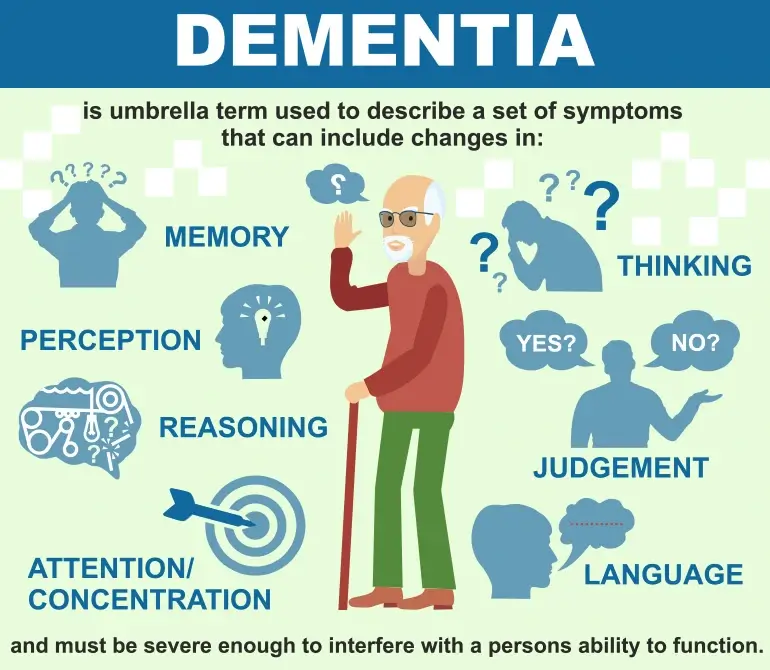Being forgetful and losing memory are two different issues one may go through. You can be forgetful due to trivial reasons that may not concern anyone, while memory loss is always due to an underlying medical condition. Although going through memory issues alone doesn’t imply one has dementia. To be diagnosed with a condition like dementia, you at least need to have two kinds of impairments that noticeably interfere with your routine.
This article will take a closer look at the types of dementia and its warning signs and treatment.
What is Dementia?
Dementia is a common term for health conditions and diseases affecting memory, reasoning, mood, thinking, behaviour and personality. Your mental function starts deteriorating while you continue your daily life and activities. This condition is more prevalent in people aged 85 or above than in any other age group.
What Causes Dementia?
Dementia happens when there is damage to the brain cells. This damage intervenes with the capability of brain cells to help them communicate with each other. Your thinking, feelings and behaviour gets impacted when your brain cells aren’t normal.
Types of Dementia
The different types of dementia include the following:
Alzheimer’s Disease- Alzheimer’s disease is one of the leading causes of dementia. It is a progressive condition that begins with minor memory loss and later results in loss of ability to communicate and respond to the surroundings. This disease involves the part of the brain that controls memory, thought and language.
Vascular Dementia- When one receives insufficient oxygen to the brain causing vascular dementia. One possible condition that it results in is stroke, but if there is anything that obstructs your blood flow due to narrowed blood vessels, it can also contribute to this condition.
Lewy Body Dementia- This condition occurs when an abnormal amount of alpha-synuclein protein starts to gather in the brain. You may experience problems while processing information and tremor and muscle stiffness.
Damage due to Stroke or Injury- When the brain doesn’t receive enough oxygen due to stroke or injury, the brain cells die, causing brain trauma.
Chronic Traumatic Encephalopathy (CTE)- It develops after continuous cases of brain trauma. One may experience symptoms such as dementia and memory loss, as well as mood swings, paranoia, and feelings of aggression.
Frontotemporal Dementia- It affects your behavioural and language abilities; this may depend on what part of your brain is damaged. Although this condition hardly has a known cause, it is probably due to genetics.
Huntington’s Disease- Huntington’s disease is an inherited, progressive disease that affects the areas of the brain responsible for a person’s voluntary movements, among others. The typical age of onset is between 30 and 50 years old trusted Source, according to the National Institute of Neurological Disorders and Stroke.
Argyrophilic Grain Disease- This disease is a neurodegenerative late-onset disease leading to the causes such as mild cognitive impairment in older adults.
Creutzfeldt-Jakob Disease- This disease is not so common and progresses rapidly, resulting in mental deterioration.
Signs and Symptoms of Dementia

There are early symptoms as well as advanced symptoms of dementia. Symptoms may vary due to the stage and kind of dementia one is going through.
Early signs of dementia include-
- Being forgetful about recent information and events
- Redundant questions or comments over a short period
- Losing commonly used things or putting them in unusual places
- Being unaware of the month and season
- Facing difficulty coming up with the right kind of words.
- Sudden change in behaviour, mood or interests
Advanced signs of dementia include:-
- Being entirely forgetful and indecisive
- Communicating and finding the right words become challenging
- Being unable to perform daily chores such as brushing teeth, bathing, cooking, etc
- Being irrational while solving the problems
- Challenges in sleeping patterns
- Worsening anxiety, agitation, distrust, confusion, depression, etc
- Going through hallucinations
Above mentioned symptoms are the most prevalent symptoms of dementia. Every dementia patient goes through different symptoms depending on their age and the part of their brain damaged. One may experience more symptoms due to other kinds of dementia.
Stages of Dementia
Understanding the stages of dementia could be challenging. Read on to understand all the stages of dementia more clearly-
Normal Behaviour
One may experience no symptoms at all, even when changes are occurring in the brain already happening. This stage occurs at the earliest age before experiencing any sign or symptom arises.
Forgetfulness
A person becomes forgetful of little things and continuously loses stuff around the house or elsewhere. Even though this symptom is not typically due to dementia, it could also be due to age-related memory issues.
Mild Decline
As dementia progresses, one may experience mild changes that could be alarming. You may frequently lose your things, such as keys or purses. This condition could last up to 7 years.
Moderate Decline
The signs and symptoms of dementia become more apparent in the later stages. One may need help managing finances or remembering their meals during the day.
Moderately Severe Decline
One becomes more dependent on another person to manage day-to-day chores in the advanced stages of dementia. Although they can care for themselves regarding personal needs such as using the toilet, they can experience trouble dressing up or remembering the simplest things like phone numbers or addresses. However, it is easier to recognise family or friends and recall events that happened in the past.
Severe Decline
In the most advanced stages, one needs constant supervision at home to be protected. They need help with almost everything as there will be massive and noticeable changes in their behaviour and personality. One may also experience anxiety and aggression issues, which may become difficult for the family members to cope with. In this condition, they would still be able to recognise the close ones that give comfort to them.
Very Severe Decline
People usually succumb to death before they reach the final stage of Dementia. In this stage, they experience severe symptoms like losing their speech and need assistance in almost everything to run the day. There must always be someone with them to protect them against any mishap.
Thus understanding the stages of dementia is essential for the loved ones of the person going through this condition day in and day out.
Diagnosis of Dementia
Dementia and its type can be challenging to diagnose. The health expert must identify the pattern of function and ascertain what the patient is still capable of to find dementia's underlying cause. Recently, biomarkers have been made accessible to diagnose Alzheimer's disease more precisely.
Your doctor will examine you physically and review your medical history and symptoms. They will also inquire about your symptoms from a trusted source. Doctors will likely do a series of tests that can assist them in identifying the issue because no available test can diagnose dementia.
Summing It Up!
Now that definition of dementia is clear; thus, one needs to understand how severe it can get gradually. Dementia could lead to severe health emergencies and accidents among people battling it, leading to hospitalisation. You would not want to exhaust yourself financially in such a situation, so ensure you already have health insurance for yourself and your loved ones beforehand. Care Health Insurance’s most comprehensive health insurance for parents plan ensures you are financially backed up for dementia after serving a waiting period of 24 months. Delay no more and get yourself a healthcare companion in time.
Disclaimer: Plan features, benefits, coverage, and claims underwriting are subject to policy terms and conditions. Kindly refer to the brochure, sales prospectus, and policy documents carefully.
